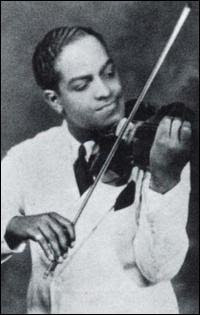Eddie South (Louisiana, Missouri, November 27, 1904 –
April 25, 1962) was one of the top American jazz violinists and band leaders of
the pre-bop era. He was a brilliant technician who, were it not for the
universal racism of the time, would probably have been a top classical
violinist. In his day he was billed as “The Dark Angel of the Violin.”
A child prodigy, Edward Otha South graduated from the
Chicago Music College. Since classical positions were not open to black
violinists in the 1920s, South learned to play jazz (helped out by Darnell
Howard). In the early to mid-'20s, he started his career playing in vaudeville
and jazz orchestras with Freddie Keppard, Jimmy Wade, Charles Elgar, and Erskine
Tate in Chicago. He studied at the Chicago College of Music alongside violinist
Petrowitsch Bissing.
In 1927 he started his own group, Eddie South and his
Alabamians, named after the Alabam club where they played in Chicago, and,
along with pianist and composer Henry Crowder, toured with them in Europe from
1928 to 1930. During this period the band recorded for Victor Records.
In the 1930s on he was in great demand in a wide range of
venues, appearing and recording in Hollywood, Chicago, New York and Paris,
frequently performing and recording in Europe: France, England and Holland. South's visit to Europe (where he studied at
the Paris Conservatoire) made a deep impression on the violinist,
particularly his visit to Budapest.
particularly his visit to Budapest.
The expressive lyricism of gypsy violin music made a deep
impression on South, and remained a powerful influence for the rest of his
life. However, that this inclination
(and his classical tendencies) conspired to marginalize his popularity among
Jazz and Popular audiences. Nonetheless,
a central European repertoire and gypsy tunes was the mainstay of Eddie South’s
personal musical style and he would often utilize gypsy melodies as a basis for
jazz improvising. In 1931, South returned to Chicago, where his regular band
included the young bassist Milt Hinton.
South also hooked into another aspect of Gypsy tradition
during his many lengthy stays in Europe, joining up with Django Reinhardt --
who was transforming his Manouche gypsy tradition into a fresh new Jazz style
with Stephane Grappelli in their Quintet
of the Hot
Club of France. The result was some of Eddie South’s most
spectacular collaborations and best pure jazz records, such as his exquisite 1937 duet with Django called “Eddie’s Blues” and several outstanding records of the Quintet with both Stephane and Eddie such as “Dinah” “Lady Be Good” and “Fiddle Blues.”
Club of France. The result was some of Eddie South’s most
spectacular collaborations and best pure jazz records, such as his exquisite 1937 duet with Django called “Eddie’s Blues” and several outstanding records of the Quintet with both Stephane and Eddie such as “Dinah” “Lady Be Good” and “Fiddle Blues.”
Although playing in the big bands of Earl Hines from 1947
to 1949 and also leading his own bands that included pianist Billy Taylor, South never really had a major breakthrough
commercially in his career. Through the ‘40s & ‘50s South continued to be
heard widely on radio in the U.S.; held numerous residencies in New York, Los
Angeles and Chicago; and performed on Armed Forces Radio.
 A 1951 recording for Chess Records, Eddy South and his Orchestra
credited Johnny Pate on bass and arrangements and was also the first of a
series of Chess recordings on which Pate collaborated with saxophonist Eddie
Johnson. South also recorded for Mercury, and also made a final set released by
Trip in 1959. He was even on Chicago television in the 1950s, and later in New
York with such TV personalities as Dave Garroway, continuing to perform until a
few weeks before his death in Chicago April 25, 1962.
A 1951 recording for Chess Records, Eddy South and his Orchestra
credited Johnny Pate on bass and arrangements and was also the first of a
series of Chess recordings on which Pate collaborated with saxophonist Eddie
Johnson. South also recorded for Mercury, and also made a final set released by
Trip in 1959. He was even on Chicago television in the 1950s, and later in New
York with such TV personalities as Dave Garroway, continuing to perform until a
few weeks before his death in Chicago April 25, 1962.
Eddie South's early recordings (covering 1927-1941) have
been reissued on a pair of Classics CDs.
(Edited from Wikipedia, Jazz Rhythm & AllMusic)






For “Eddie South: Chronological Classics 1923-1937” go here:
ReplyDeletehttps://www.upload.ee/files/9238806/Eddie_South_23_37.rar.html
1 Someday, Sweetheart
2 La Rosita
3 The Voice Of The Southland
4 By The Waters Of Minnetonka
5 My Ohio Home
6 That's What I Call Keen
7 Doin' The Raccoon
8 Two Guitars
9 Marcheta
10 Hejre Kati
11 Old Man Harlem
12 No More Blues
13 Nagasaki
14 My! Oh My!
15 Mama Mockin-Bird
16 Gotta Go
17 Eddie's Blues
18 Sweet Georgia Brown
19 Lady Be Good
20 Dinah
21 Daphné
22 Somebody Loves Me
23 I Can't Believe That You're In Love With Me
24 Improvisation Sur Le Premier Mouvement Du Concerto En Ré Mineur
De Jean-Sébastien Bach - Part I
A big thank you to MusicMan 1915 @ Archive.org for original post of mp3s. Artwork added from AllMusic.
Thanks, Bob!
ReplyDeleteThank you!
ReplyDelete